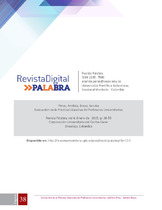Mostrar el registro sencillo del ítem
Evaluación de la práctica educativa de profesores universitarios
| dc.contributor.author | Pérez Cardona, Análida | |
| dc.contributor.author | Bravo Guerrero, Sandra | |
| dc.contributor.author | Ríos Enríquez, Neri Elia | |
| dc.coverage.spatial | Seccional Medellín | spa |
| dc.date.accessioned | 2020-11-30T14:12:44Z | |
| dc.date.available | 2020-11-30T14:12:44Z | |
| dc.date.issued | 2015 | |
| dc.identifier.uri | http://hdl.handle.net/20.500.11912/6760 | |
| dc.description | p. 38 - 55 | spa |
| dc.description.abstract | This research was carried out during the first half of 2009, in three Latin American universities. The aim was to assess the educational practice of three teachers (two from Mexico and one from Colombia), in order to identify their strengths and weaknesses, through the analysis of different dimensions and their pedagogical relation, and the use of different evaluation instruments. The investigation had a qualitative approach in which the study case and the action research were applied. The data collection instruments were: interview to teachers, guide of observation, guide for document review and self-evaluation card for teachers. After analyzing the data, it was found that the most evident strengths in the three teachers are: the commitment to their work, the affection for their students and the knowledge of the taught subject. The major weaknesses the teachers present are: the lack of use of electronic resources for developing class activities and the little diversification of teaching and learning strategies. | spa |
| dc.description.abstract | Esta investigación se llevó a cabo durante el primer semestre de 2009, en tres universidades latinoamericanas. El objetivo fue evaluar la práctica educativa de tres profesores (dos mexicanos y uno colombiano), para identificar sus fortalezas y debilidades a través del análisis de diferentes dimensiones y la relación pedagógica que hay entre ellas, y del uso de diferentes instrumentos de evaluación. La investigación tuvo un enfoque cualitativo en el que se emplearon el estudio de casos y la investigación acción. Los instrumentos de recolección de datos fueron: formato de entrevista para profesores, guía para la revisión de documentos, guía de observación y ficha de auto evaluación docente. Después de analizar los datos, se encontró que las fortalezas más evidentes en los tres profesores son: el compromiso con su trabajo, el afecto hacia sus alumnos y el conocimiento de la materia enseñada. Las mayores debilidades que presentan los docentes son: la falta de uso de recursos electrónicos para desarrollar actividades en clase y la poca diversificación de estrategias de enseñanza aprendizaje. | spa |
| dc.format.mimetype | application/pdf | |
| dc.language.iso | spa | |
| dc.publisher | Universidad Pontificia Bolivariana | spa |
| dc.relation.ispartof | Revista Digital Palabra | spa |
| dc.rights | Attribution-NonCommercial-NoDerivatives 4.0 International | * |
| dc.rights.uri | http://creativecommons.org/licenses/by-nc-nd/4.0/ | * |
| dc.subject | Práctica educativa | spa |
| dc.subject | Evaluación docente | spa |
| dc.subject | Investigación educativa | spa |
| dc.subject | Educational practice | spa |
| dc.subject | Teacher evaluation | spa |
| dc.subject | Educational research | spa |
| dc.title | Evaluación de la práctica educativa de profesores universitarios | spa |
| dc.type | article | spa |
| dc.rights.accessRights | openAccess | spa |
| dc.type.hasVersion | publishedVersion | spa |
| dc.description.sectional | Medellín | spa |
| dc.identifier.instname | instname:Universidad Pontificia Bolivariana | spa |
| dc.identifier.reponame | reponame:Repositorio Institucional de la Universidad Pontificia Bolivariana | spa |
| dc.identifier.repourl | repourl:https://repository.unab.edu.co/ |


